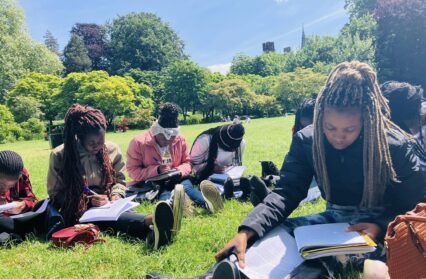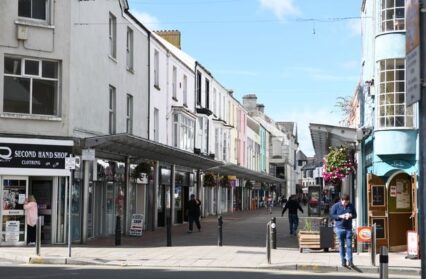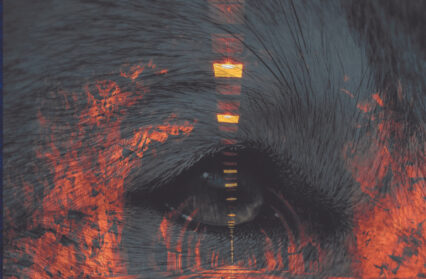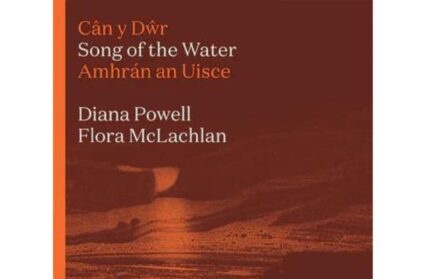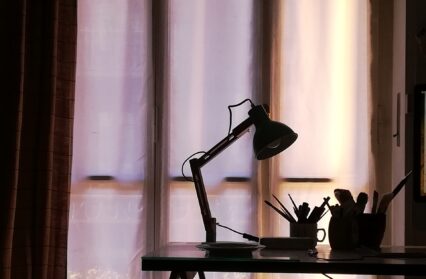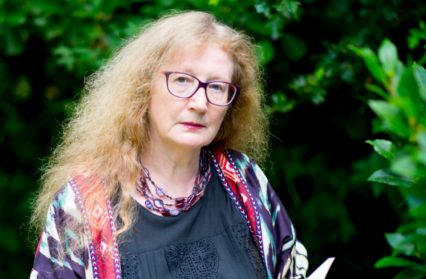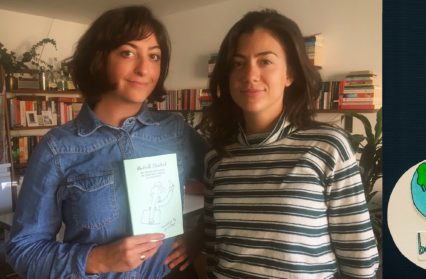Christina Thatcher offers an insight into the recent Welsh and Zimbabwean Women’s Writing Project, which took place in Godess Bvukutwa, Mambakwedza Women’s Center.
Zimbabwe is a beautiful country with sprawling Savanna grasslands, an extensive variety of flora and fauna, and our Eastern ranges of mountains are a hiker and explorer’s dream. Not only is Zimbabwe home to the largest man-made lake in Africa, it has the honor of housing one of the Wonders of the World, the Victoria Falls. Aptly named by the Tonga natives, the Mo-sia-tunya, meaning ‘the smoke that thunders’, it is a common destination on many people’s bucket lists. Why am I rambling on about the physical beauty that is Zimbabwe? Because the warmth that exudes from the smiles of Zimbabwean people is more captivating. The creative arts and rich culture of various ethnic groups that make up Zimbabwe will strike you and stay with you longer than our diverse wildlife and glorious sunsets.
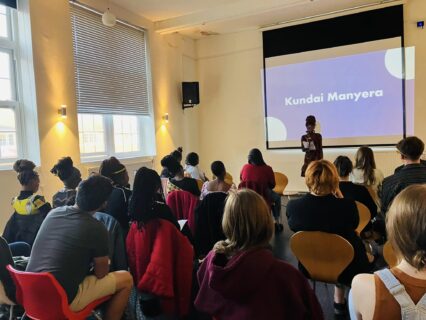
However, when it comes to opportunities, Zimbabwe is not the first country that would come to many people’s minds. This fact is more glaring in our arts and culture industry; opportunities for growth and cultivation of talent come by with the frequency that a vehicle passes by a dirt road in a rural village in Hurungwe district where I started training young women in leadership when I first registered Mambakwedza Women’s Center. Every talent needs to be watered, weeded and well fed and writing is no exception. In places like Hurungwe where I grew up, not only is writing looked down upon, but there are not many ways in which one can get support and skills to enhance their writing, especially when most writers cannot afford to make a career out of it.
It is in this unfertile background that the When Women Write project was conceived. With the funding of British Council Wales, we trained 19 Welsh and Zimbabwean young women from Hurungwe district and South Wales. Dr. Christina Thatcher, whom I found online, had graciously agreed to become my partner along with her colleague from Cardiff Metropolitan University, Dr. Kate North. I learnt how to plan and deliver the writing workshops from Christina who has loads of experience in teaching. I had never facilitated a writing workshop, reason being…again almost zero opportunities for that.
Speaking of workshop facilitation in the second phase of our project, Where I’m Writing From, we wanted external workshop facilitators for our virtual writing retreats and it was quite a challenge getting anyone to be interested in this paid position (emphasis on paid because the few writing jobs that come about, are not always paid). I later realized how daunting the call for expressions of interest must have looked to our Zimbabwean female writers based in Zimbabwe because many of them do not have the experience of facilitating writers’ workshops. Finally, we got Mercy Dhliwayo, a lawyer/writer and spoken word artist based in South Africa to facilitate the workshops.
One of the highlights of our partnership was when Christina and I won the Hub Cymru Partnership Award in 2022, without ever meeting each other in person. However, a great partnership does not mean a smooth working relationship without differing opinions on particular issues. It means respecting one another, constantly sharpening your problem-solving skills, listening to learn, sharing responsibilities as equitably as possible amongst other factors. And of course, it always helps to have Kate, the third partner, on board when it comes to decision making. An example of a sticky situation that Kate came to the rescue for was in naming the third phase, the Can You Hear Us? project, when Christina and I were stuck in a stalemate on which name to go for.
Dr Kate North, Cardiff Metropolitan University
When I was invited to work with Christina and Godess on this Zimbabwe/Wales project, in the middle of the pandemic, I thought it was ambitious, exciting and a bit crazy. What happens when you put a group of women and girls from Wales and Zimbabwe in a virtual classroom and get them writing? I didn’t know what to expect but what I discovered was transformative and powerful.
Godess has already explained the rationale for the need to support artists’ development in Zimbabwe and Hurungwe in particular. I’ll explain why we feel this project was also needed here in Wales. Much is said about the perilous state of the arts in the UK and Wales. We have a Westminster government that is hostile towards ‘rip off degrees’, those subjects that don’t lead you directly into specific professions or STEM careers. The ability to support arts in schools is stymied by budgets in Wales (despite having a new curriculum that actively encourages arts across it), this leaves arts and humanities subjects to be studied by an increasingly rarefied demographic. The kids whose parents could afford extra-curricula arts and culture activities for them.
Despite all of this, we are also incredibly lucky, something I understood even more after learning about the lack of provision in Zimbabwe. We have Arts Council Cymru, we have the National Companies of Wales such as Literature Wales, Theatre Genedlaethol, National Theatre of Wales, etc. And of course, British Council Cymru (our funder – diolch!). We have publicly subsidized organisations whose whole raison d’etre is to facilitate access to the arts and culture in Wales, develop artists and showcase the breadth and depth of creative talent we have in our small nation of just over 3 million people.
However, we know these gifts do not reach all, there are people who are habitually ignored, dismissed, unseen, unheard and labelled ‘hard to reach’. That phrase always puzzles me. How can anyone be hard to reach when we know where they are? Is it systemic, or insufficient funding, cultural policing, class oppression?
This project didn’t try to answer any of these questions, how could it? Our project was about doing something productive, inclusive and useful for the women involved, as a mission statement and an aim, in an of itself. Wales is often shown to be the poor cousin in the wider UK context with the highest poverty rates. More specifically, one in four people and 38% of children in Wales live in poverty (according to Oxfam and Children in Wales). Given this backdrop, we wanted to include women who could most benefit from this development opportunity and we recruited with this broader criterion as a stipulation.
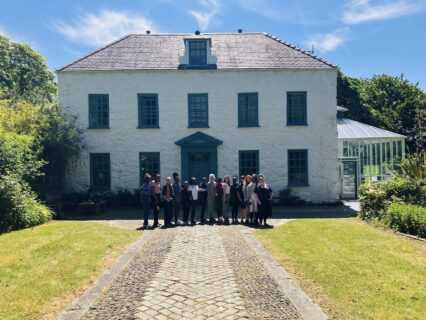
Going back to the question, what happens when you put Welsh and Zimbabwean women in a virtual space (writing workshop, writing retreat, a book launch), and then bring them together for an in-person live reading in Chapter arts center? Wonderful things happened. The participants explored their immediate environment in their writing, their home landscapes, the land that surrounds them. It showed me how intrinsic environment can be to how we express ourselves. It was powerful to see how much the women had in common, how land can shape one’s sense of self. It was also saddening, maddening, and oddly validating to hear how misogyny and sexism have no borders, as shown through the poetry and prose the participants created, drawing on their lived experience. I am proud to have helped in the editing and mentoring of the publications that have come out of this project including the When Women Write and Where I’m Writing From anthologies.
Then there was the technical learning that took place, how to mediate digital spaces, how to use them to create, how to respond when they fail. We are hoping to bring together what we have learned as a toolkit to help others who are looking to create and sustain creative digital partnerships.
Dr Christina Thatcher, Cardiff University
As a writer, it is ridiculous to admit that I am still searching for the words to convey everything I have learned from this project. Highlighting the knowledge or digital skills I’ve gained feels inadequate. But then, reaching for a word like ‘transformed’—to describe my personal growth—feels too abstract, particularly when so much of what we did was grounded: building a digital space, leading creative writing sessions, listening to these young women, editing their work and hosting events for them to share it.
When we first started out, Godess and I were leading workshops across all genres: poetry, fiction, nonfiction, hybrid writing and more. We brought in poems and stories from British and African writers to read and discuss, provided writing prompts and taught craft too: what makes a good piece of writing? But, what we slowly started to realize, is that regardless of the prompts we were giving, much of the writing from these young women circled around the concept of place. Over time, we learned that place writing, in particular, could serve as an important vehicle for investigating womanhood and identity. By writing about landscapes in Wales and Zimbabwe, and examining the concept of ‘home’, these writers started to speak about who they are and where they came from. When we were discussing place, we were actually discussing ourselves, our values and our experiences as woman.
This established an important idea: understanding each other involved understanding where we came from. Then, when a group of our Zimbabwean writers travelled to Wales, they got to see this place that our Welsh participants were writing about and experience it for themselves. As part of this trip, we travelled to Tŷ Newydd Writing Centre where we held workshops on ‘Writing and Cultural Narratives’, ‘Writing and Empowerment’ and ‘Writing and Leadership’. Of course, writing was produced in response to the prompts we gave in these sessions. However, when asked to submit work for an upcoming anthology many of the writers circled back to place again.
Welsh writer, Rhiannon Griffiths, takes us to her home in south Wales in her poem ‘The Commoners’:
Welcome to South Wales
nothing is more common than this land
a mix of city and valley colliding together
like oil and water.
Zimbabwean writer, Nobukhosi Ndlovu, straddled two homes in her poem ‘Ty Newydd’, exclaiming ‘Ty Newydd! Oh Ty Newydd / You have pushed hiraeth* away’, ending with ‘never have I ever / imagined it possible / to have two homes.’
At one point during our visit to north Wales, we meandered down to the sea near Criccieth. Many of the Zimbabwean woman hadn’t gone swimming in the sea before so, with much laughter and excitement, we dove in—swimming between the seaweed and reveling in the beauty of that place. One of the Zimbabwean writers, Eve Mary Panashe Zunza, picked up some pebbles which she later used as a metaphor in her poem ‘The Mystery of Womanhood’:
‘Beach pebbles are formed by weathering.
The physical breakdown of exposed rock surfaces.
Womanhood is defined by physical and emotional pain,
exposure to deception and hatred,
the greatest weakness of wanting to be loved.’
It has been an incredible privilege for all of us to meet these young women and learn from them, online and in Wales. Although writing was at the heart of everything we did, these projects offered so much more than that. They built bridges between cultures, amplified young women’s voices, and established a supportive creative community by woman, for woman. All of us have come away with a better understanding of ourselves and the places that mean something to us. Still, I do not have the right words to end here, to sum up what this all has meant. So, I will just say thank you / diolch / tatenda / ngiyabonga.


